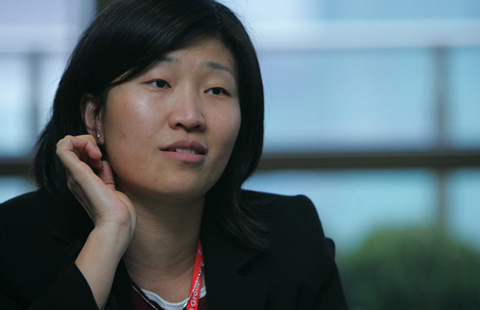Innovation is an institutional design
Updated: 2015-05-08 16:40
By Li Yang(chinadaily.com.cn)
|
||||||||
To expedite the transformation of ideas into reality, China will take incentive measures to encourage the free flow of knowledge and expertise from universities and institutes to enterprises, from laboratories to workshops.
Some analysts compare this to two milestone plans that have helped shape the global economy; Germany's Industry 4.0 action programme, and the United States' reindustrialization initiative. All three resort to the Internet to break the information asymmetry, lower transaction costs, promote division of labor based on specialization and improve labor productivity.
Although there is still big gap between China and its two main trade partners, the US and Germany, the fast rising momentum of China's input in research and development lays a solid foundation for the world largest manufacturer to become more qualitative than quantitative in catching up the advanced manufacturing powers.
According to the Organization of Economic Cooperation and Development, China's input in R&D doubled in the past five years hitting $311 billion last year, overtaking that of the European Union ($292 billion) for the first time. If China can make its R&D input account for about 2.5 percent of its gross domestic product by 2020, it will surpass the US in 2019 and become the largest spender on innovation.
Yet, China still has a long way to go in translating the sizable input into concrete output.
Experts classify innovations into three kinds: continuous innovation, market innovation and efficiency innovation.
Thanks to its belief in discipline and technology, Germany became the best continuous innovator, which emphasizes constant upgrading of technologies.
The US is a good example of market innovation, which refers to the paradigm-changing creations. The revolutionary innovations of the information technologies and the number of its applications born in the US are testimony to the country's success in exploring new possibilities of human intelligence.

 Cannes Film Festival unrolls star-studded red carpet
Cannes Film Festival unrolls star-studded red carpet
 Amazing artworks in supermarkets
Amazing artworks in supermarkets
 Top 10 venture investors in the world
Top 10 venture investors in the world
 Ten photos you don't wanna miss - May 14
Ten photos you don't wanna miss - May 14
 Classical private school in Qinling Mountain
Classical private school in Qinling Mountain
 Heads of state show you around Xi'an
Heads of state show you around Xi'an
 Cross dressing for Peking Opera
Cross dressing for Peking Opera
 Ten photos you don't wanna miss - May 13
Ten photos you don't wanna miss - May 13
Most Viewed
Editor's Picks

|

|

|

|

|

|
Today's Top News
Xi to give Modi a hometown welcome
Cui rebuffs US criticism on China Sea
China set to delay maiden flight of C919 commercial jet
Police warn 'strange outfits' on subway may cause stampedes
At least six die in Philadelphia train derailment, scores hurt
Cui: How to get a win-win in Asia
Animated Deng Xiaoping set to hit silver screen this week
Foreign reserves show a record decline in Q1
US Weekly

|

|






